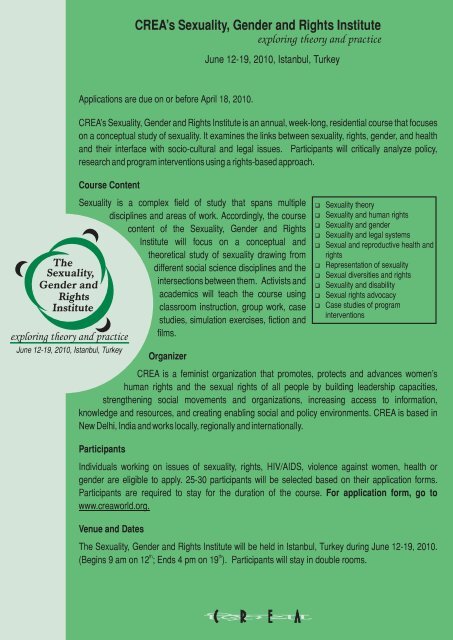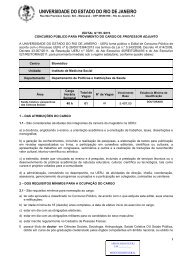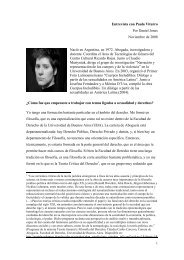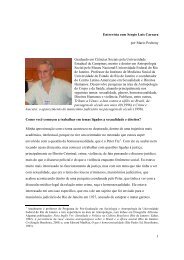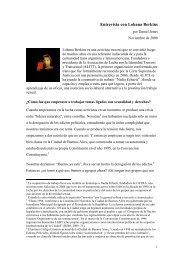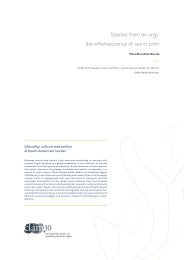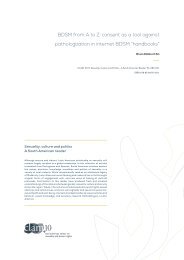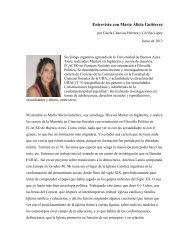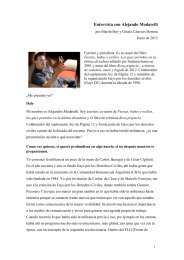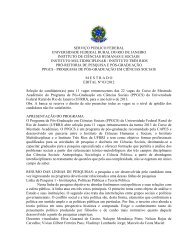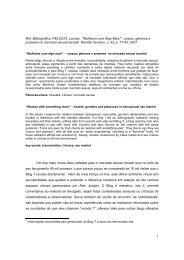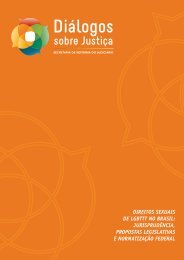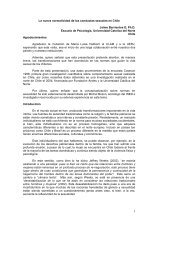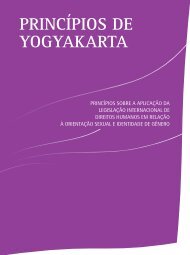CREA's Sexuality Gender and Rights Institute
CREA's Sexuality, Gender and Rights Institute
CREA's Sexuality, Gender and Rights Institute
- No tags were found...
Create successful ePaper yourself
Turn your PDF publications into a flip-book with our unique Google optimized e-Paper software.
<strong>CREA's</strong> <strong>Sexuality</strong>, <strong>Gender</strong> <strong>and</strong> <strong>Rights</strong> <strong>Institute</strong><br />
exploring theory <strong>and</strong> practice<br />
June 12-19, 2010, Istanbul, Turkey<br />
The<br />
<strong>Sexuality</strong>,<br />
<strong>Gender</strong> <strong>and</strong><br />
<strong>Rights</strong><br />
<strong>Institute</strong><br />
exploring theory <strong>and</strong> practice<br />
Applications are due on or before April 18, 2010.<br />
<strong>CREA's</strong> <strong>Sexuality</strong>, <strong>Gender</strong> <strong>and</strong> <strong>Rights</strong> <strong>Institute</strong> is an annual, week-long, residential course that focuses<br />
on a conceptual study of sexuality. It examines the links between sexuality, rights, gender, <strong>and</strong> health<br />
<strong>and</strong> their interface with socio-cultural <strong>and</strong> legal issues. Participants will critically analyze policy,<br />
research <strong>and</strong> program interventions using a rights-based approach.<br />
Course Content<br />
June 12-19, 2010, Istanbul, Turkey<br />
<strong>Sexuality</strong> is a complex field of study that spans multiple<br />
disciplines <strong>and</strong> areas of work. Accordingly, the course<br />
content of the <strong>Sexuality</strong>, <strong>Gender</strong> <strong>and</strong> <strong>Rights</strong><br />
<strong>Institute</strong> will focus on a conceptual <strong>and</strong><br />
theoretical study of sexuality drawing from<br />
different social science disciplines <strong>and</strong> the<br />
intersections between them. Activists <strong>and</strong><br />
academics will teach the course using<br />
classroom instruction, group work, case<br />
studies, simulation exercises, fiction <strong>and</strong><br />
films.<br />
Organizer<br />
CREA is a feminist organization that promotes, protects <strong>and</strong> advances women's<br />
human rights <strong>and</strong> the sexual rights of all people by building leadership capacities,<br />
strengthening social movements <strong>and</strong> organizations, increasing access to information,<br />
knowledge <strong>and</strong> resources, <strong>and</strong> creating enabling social <strong>and</strong> policy environments. CREA is based in<br />
New Delhi, India <strong>and</strong> works locally, regionally <strong>and</strong> internationally.<br />
Participants<br />
Individuals working on issues of sexuality, rights, HIV/AIDS, violence against women, health or<br />
gender are eligible to apply. 25-30 participants will be selected based on their application forms.<br />
Participants are required to stay for the duration of the course. For application form, go to<br />
www.creaworld.org.<br />
Venue <strong>and</strong> Dates<br />
The <strong>Sexuality</strong>, <strong>Gender</strong> <strong>and</strong> <strong>Rights</strong> <strong>Institute</strong> will be held in Istanbul, Turkey during June 12-19, 2010.<br />
th<br />
th<br />
(Begins 9 am on 12 ; Ends 4 pm on 19 ). Participants will stay in double rooms.<br />
<br />
<br />
<br />
<br />
<br />
<br />
<br />
<br />
<br />
<br />
<strong>Sexuality</strong> theory<br />
<strong>Sexuality</strong> <strong>and</strong> human rights<br />
<strong>Sexuality</strong> <strong>and</strong> gender<br />
<strong>Sexuality</strong> <strong>and</strong> legal systems<br />
Sexual <strong>and</strong> reproductive health <strong>and</strong><br />
rights<br />
Representation of sexuality<br />
Sexual diversities <strong>and</strong> rights<br />
<strong>Sexuality</strong> <strong>and</strong> disability<br />
Sexual rights advocacy<br />
Case studies of program<br />
interventions
<strong>CREA's</strong> <strong>Sexuality</strong>, <strong>Gender</strong> <strong>and</strong> <strong>Rights</strong> <strong>Institute</strong><br />
exploring theory <strong>and</strong> practice<br />
Participating Faculty<br />
Alice Miller, JD is Lecturer in Residence <strong>and</strong> Senior Fellow at the Miller <strong>Institute</strong> for Global Challenges <strong>and</strong> the Law, University of California,<br />
Berkeley Law School. Miller co-directed the human rights Center <strong>and</strong> master's program at Columbia University <strong>and</strong> teaches in the areas of<br />
sexuality, rights, law, gender, health, <strong>and</strong> humanitarian issues. She combines extensive advocacy experience with her academic work. She<br />
specializes in developing a framework for human rights claims in the context of contemporary underst<strong>and</strong>ings of sexuality <strong>and</strong> globalized<br />
networks <strong>and</strong> advocacy work.<br />
Carole S. Vance, Ph.D., M.P.H., teaches anthropology at the Mailman School of Public Health <strong>and</strong> is Director of the Program for the Study of<br />
<strong>Sexuality</strong>, <strong>Gender</strong>, Health <strong>and</strong> Human <strong>Rights</strong> at Columbia University. She has written widely about sexual theory; science, sexuality, gender, <strong>and</strong><br />
health; <strong>and</strong> policy controversies about sexual expression <strong>and</strong> imagery. She is editor of Pleasure <strong>and</strong> Danger: Exploring Female <strong>Sexuality</strong> (1993).<br />
In 2005, she received the David R. Kessler Award for lifetime contribution to the study of sexuality.<br />
Geetanjali Misra is co-founder <strong>and</strong> Executive Director of CREA <strong>and</strong> co-Director of the <strong>Sexuality</strong> <strong>and</strong> <strong>Rights</strong> <strong>Institute</strong> in India. She has worked at<br />
the activist, grant making <strong>and</strong> policy levels on issues of sexuality, reproductive health, gender, human rights <strong>and</strong> violence against women. She<br />
writes on issues of sexuality, gender <strong>and</strong> rights <strong>and</strong> had co-edited <strong>Sexuality</strong>, <strong>Gender</strong> <strong>and</strong> <strong>Rights</strong>: Exploring Theory <strong>and</strong> Practice in South <strong>and</strong><br />
Southeast Asia (2005).<br />
Irazca Geray is a program <strong>and</strong> publications officer at WWHR – New Ways, an autonomous women's NGO founded in 1993, based in Turkey. She<br />
has co-coordinated several advocacy campaigns for law reform <strong>and</strong> is the editor of a number of WWHR publications including the Purple<br />
Newsletter, CSBR e-news <strong>and</strong> United Nations CEDAW Process <strong>and</strong> Advocacy <strong>and</strong> Lobbying with Non-Governmental Organizations – Shadow<br />
Reports from Turkey: 1997 & 2005 Experiences.<br />
Janet Price is a feminist <strong>and</strong> disabled campaigner from Northern Engl<strong>and</strong> who is a member of the <strong>Gender</strong> <strong>and</strong> Health Group <strong>and</strong> an Honorary<br />
Research Fellow at Liverpool School of Tropical Medicine. She works on issues of sexuality, disability <strong>and</strong> rights with organizations in India <strong>and</strong> UK<br />
<strong>and</strong> is on the Board of DaDa (Disability <strong>and</strong> Deaf Arts) based in Liverpool. Her academic interests include postmodern feminist perspectives on<br />
colonialism, disability <strong>and</strong> the body <strong>and</strong> she has co-edited Feminist Theory <strong>and</strong> the Body: AReader (1999) with Margrit Shildrick.<br />
Mauro Cabral*, co-director of GATE (Global Trans Advocates for Trans Equality), is a philosopher from Cordoba, Argentina who is involved with<br />
diverse academic <strong>and</strong> political initiatives focused on bodily diversity <strong>and</strong> sexual rights. He participated in the experts' seminar that proposed the<br />
Principles of Yogyakarta on Sexual Orientation, <strong>Gender</strong> Identity <strong>and</strong> Human <strong>Rights</strong>. Cabral has published several articles on trans <strong>and</strong> intersex<br />
issues <strong>and</strong> edited Interdiciones. Escrituras de la intersexualidad en castellano (Anarrés Editorial, 2009). *To be confirmed.<br />
Meena Seshu is the general secretary of SANGRAM, an organization that works on the rights of sex workers <strong>and</strong> people living with HIV/AIDS.<br />
SANGRAM's Centre for Advocacy on Stigma <strong>and</strong> Marginalisation (CASAM) advocates for the reduction of stigma, violence <strong>and</strong> harassment of<br />
marginalized communities, especially those who have challenged dominant norms. In 2002, Seshu was awarded the Human <strong>Rights</strong> Defender<br />
Award from Human <strong>Rights</strong> Watch.<br />
Radhika Ch<strong>and</strong>iramani is Founder <strong>and</strong> Executive Director of TARSHI (Talking about Reproductive <strong>and</strong> Sexual Health Issues), Director of the<br />
South <strong>and</strong> Southeast Asia Resource Centre on <strong>Sexuality</strong> <strong>and</strong> co-Director of the <strong>Sexuality</strong> <strong>and</strong> <strong>Rights</strong> <strong>Institute</strong> in India. She co-edited <strong>Sexuality</strong>,<br />
<strong>Gender</strong> <strong>and</strong> <strong>Rights</strong>: Exploring Theory <strong>and</strong> Practice in South <strong>and</strong> South East Asia (2005) <strong>and</strong> authored Good Times for Everyone: <strong>Sexuality</strong><br />
Questions, Feminist Answers (2008).<br />
Sealing Cheng, Ph.D. is Assistant Professor in the Women's <strong>and</strong> <strong>Gender</strong> Studies Department, Wellesley College. Her research is focused on<br />
sexuality with reference to sex work, human trafficking, women's activism, <strong>and</strong> policy-making. Her book On the Move for Love: Migrant<br />
Entertainers <strong>and</strong> the U.S. Military in South Korea is published in 2010 with the University of Pennsylvania Press.<br />
Shohini Ghosh is Sajjad Zaheer Professor of Video & TV Production at the AJK Mass Communication Centre at Jamia Millia Islamia (India). She<br />
is co-founder member of Mediastorm Collective, India's first all women documentary production collective. Ghosh directed Tales of the<br />
Nightfairies (2002) a film about the sex workers'struggle for rights in Calcutta. Currently, she is writing a book on the film Fire for the Queer Classics<br />
Series (Arsenalpulp Press, Canada).<br />
Svati P. Shah, Ph.D. is an Assistant Professor of Women's, <strong>Gender</strong> <strong>and</strong> <strong>Sexuality</strong> Studies at the University of Massachusetts at Amherst. Shah's<br />
work has been published in a range of scholarly <strong>and</strong> progressive journals, including <strong>Gender</strong> <strong>and</strong> History, Cultural Dynamics, Rethinking Marxism,<br />
<strong>and</strong> SAMAR: South Asian Magazine for Action <strong>and</strong> Reflection. She is currently working on a book on sex work <strong>and</strong> migration in Mumbai's informal<br />
sector.<br />
Applications are due on or before April 18, 2010. Applications received after this date will not be considered.<br />
Contact Person: Sushma Luthra; E-mail: sluthra@creaworld.org<br />
New Delhi: crea@vsnl.net; +91-11-2437-7707; New York: mailcrea@verizon.net; +1-212-599-1071<br />
www.creaworld.org


